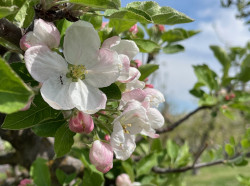Research Molecular Biologist
Education:
B.S. and M.S., University of Torino, Italy, Plant Biology, 2007
Ph.D., John Innes Centre, UK, Disease and Stress Biology, 2012
Background:
Dr. Pitino has an extensive background in molecular biology and plant pathology, encompassing a deep exploration of plant, insect, and pathogen interactions. His work centers on identifying key effector proteins involved in these interactions and developing innovative countermeasures, such as specialized protein inhibitors, to mitigate the harmful effects of plant pathogens. Committed to sustainable agriculture, Dr. Pitino's research extends to harnessing the power of entomopathogenic fungi as an eco-friendly alternative to traditional pest control methods. He is also at the forefront of developing environmentally friendly delivery systems for therapeutic agents in plants.
Research Interests:
Plant-Insect Interactions: Dr. Pitino focuses on identifying effector proteins and their mechanisms in pathogen transmission by insect vectors, and applying gene silencing techniques to disrupt disease pathways.
Plant-Pathogen Interactions: He investigates the molecular dynamics and effector proteins that drive disease development in plants.
Integrated Pest and Pathogen Management: Dr. Pitino is dedicated to developing sustainable biotechnological solutions for effective pest and pathogen control in agriculture.
Plant Therapeutic Delivery Systems; Dr. Pitino pioneers the delivery of therapeutic agents in plants using innovative technologies like Direct Plant Infusion (DPI) and Symbiont technology, ensuring efficient and precise application in diverse agricultural settings.
Sustainable Agriculture: Dr. Pitino utilizes advanced biotechnological tools and explores sustainable agriculture methods, including biological control with entomopathogen fungi, to promote environmental health and food security.
Approach:
Dr. Pitino's research approach embodies the following key principles:
- Enhancing sustainable pest control by minimizing reliance on chemical pesticides.
- Developing biotechnologies for disease management.
- Investigating molecular mechanisms of plant-pathogen interactions and disease development.
- Developing innovative methods for targeted application of therapeutic agents in plants.
- Fostering a culture of collaboration.
Laboratory Personnel:
Doug Harper, Biological Science Technician
- (Clicking on the reprint icon
 will take you to the publication reprint.)
will take you to the publication reprint.)
- Gene expression profiling of Cacopsylla pyricola (Hemiptera: Psyllidae) infected with Ca. Phytoplasma pyri (Acholeplasmatales: Acholeplasmataceae) reveals candidate effectors and mechanisms of infection
 -(Peer Reviewed Journal)
-(Peer Reviewed Journal)
Easterling, K.A., Marshall, A.T., Pitino, M., Walker Iii, W.B., Cooper, W.R. 2024. Gene expression profiling of Cacopsylla pyricola (Hemiptera: Psyllidae) infected with Ca. Phytoplasma pyri (Acholeplasmatales: Acholeplasmataceae) reveals candidate effectors and mechanisms of infection. Environmental Entomology. https://doi.org/10.1093/ee/nvae074.
- Symbiont Technology: development and optimization of a novel delivery approach for therapeutics to control Candidatus Liberibacter asiaticus-(Abstract Only)

- Discovery of nodule-specific cysteine rich peptides that block psyllid acquisition of ‘Candidatus Liberibacter asiaticus-(Abstract Only)

- Las 5315 effector induces extreme starch accumulation and chlorosis as Ca. Liberibacter asiaticus infection in Nicotiana benthamiana-(Peer Reviewed Journal)
Pitino, M., Allen, V.W., Duan, Y. 2018. Las 5315 effector induces extreme starch accumulation and chlorosis as Ca. Liberibacter asiaticus infection in Nicotiana benthamiana. Frontiers in Plant Science. 9:113.
- Molecular mechanisms behind the accumulation of adenosine triphosphate (ATP) and H2O2 in citrus plants in response to ‘Candidatus Liberibacter asiaticus’ infection
 -(Peer Reviewed Journal)
-(Peer Reviewed Journal)
Pitino, M., Armstrong, C.M., Duan, Y. 2017. Molecular mechanisms behind the accumulation of adenosine triphosphate (ATP) and H2O2 in citrus plants in response to ‘Candidatus Liberibacter asiaticus’ infection. Horticulture Research. 4(Article number 17040). https://doi.org/10.1038/hortres.2017.40.
- Transient expression of Candidatus Liberibacter asiaticus effector induces cell death in Nicotiana benthamiana
 -(Peer Reviewed Journal)
-(Peer Reviewed Journal)
Pitino, M., Armstrong, C.M., Cano, L.M., Duan, Y. 2016. Transient expression of Candidatus Liberibacter asiaticus effector induces cell death in Nicotiana benthamiana. Frontiers in Plant Science. 7:982. doi: 10.3389/fpls.2016.00982.
- Transgenic Carrizo expressing 'Candidatus Liberibacter asiaticus' effector P235 displays huanglongbing-like symptom and alters some gene expression-(Abstract Only)
Hao, G., Pitino, M., Ammar, E., Duan, Y., Stover, E.W. 2016. Transgenic Carrizo expressing 'Candidatus Liberibacter asiaticus' effector P235 displays huanglongbing-like symptom and alters some gene expression [abstract]. American Phytopathological Society Abstracts, July 30 - August 1, 2016, Tampa, Florida.
- Rapid Screening for Citrus Canker Resistance Employing Pathogen-Associated Molecular Pattern-Triggered Immunity Responses
 -(Peer Reviewed Journal)
-(Peer Reviewed Journal)
Pitino, M., Armstrong, C.M., Duan, Y. 2015. Rapid Screening for Citrus Canker Resistance Employing Pathogen-Associated Molecular Pattern-Triggered Immunity Responses. Horticulture Research. 2:15042. https://doi.org/10.1038/hortres.2015.42.
- Induction of innate immune responses by flagellin from the intracellular bacterium, ‘Candidatus Liberibacter solanacearum’
 -(Peer Reviewed Journal)
-(Peer Reviewed Journal)
Hao, G., Pitino, M., Ding, F., Lin, H., Stover, E.W., Duan, Y. 2014. Induction of innate immune responses by flagellin from the intracellular bacterium, ‘Candidatus Liberibacter solanacearum’. Biomed Central (BMC) Plant Biology. 14:211. https://doi.org/10.1186/s12870-014-0211-9.
- The phloem-sap feeding mealybug (Ferrisia virgata) carries 'Candidatus Liberibacter asiaticus' populations without transmitting disease
 -(Peer Reviewed Journal)
-(Peer Reviewed Journal)
Pitino, M., Hoffman, M.T., Zhou, L., Stocks, I.C., Duan, Y. 2014. The phloem-sap feeding mealybug (Ferrisia virgata) carries 'Candidatus Liberibacter asiaticus' populations without transmitting disease. PLoS One. 9(3):e92757. https://doi.org/10.1371/journal.pone.0092757.
- (Clicking on the reprint icon
Integrated Approach to Manage the Pest Complex on Temperate Tree Fruits In-House Appropriated (D) Accession Number:439454 
Precision Agriculture: Innovating Cherry Disease Management with Direct Plant Infusion Trust Fund Cooperative Agreement (T) Accession Number:445181 
Sustainable Cherry Protection with SYMBIONT Trust Fund Cooperative Agreement (T) Accession Number:445187 
No news articles listed for this employee.


